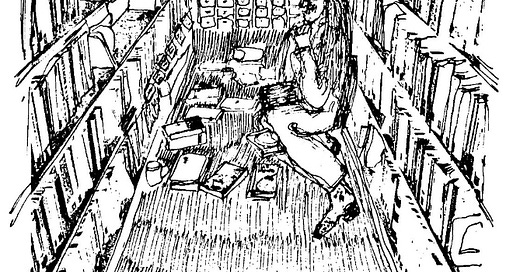The other day I sat on the floor of the library, in the Biblical criticism section, with my papers, notebooks, and texts spread around me, for five hours. I emerged from the stacks with pins and needles in my feet and a glorious sense of achievement. Nothing was finished, nothing was strictly “accomplished,” but I had had an interaction with a book on my own terms. I had figured things out for myself. And by the sweeping and comprehensive word things I mean about one hundred lines of the Iliad.
I was an ignorant schoolmaster, to borrow a phrase from Rancière. Knowing no more Greek than the alphabet, I went painstakingly through the interlinear figuring out if my hunch about diction between a simile and the main narrative was right—and it was! But it was only because I had pushed myself to memorize the simile in Greek that I was able to find those echoing words in the text.
In the span of that afternoon I learned more about the Iliad than I have all term in class. And this is not a depressing thought to me, nor is it a poor reflection on the class itself. But it is a boggling reminder that one must write about something and give over hours of lonely thought and attention before anything in a book like the Iliad comes into focus. I rewarded myself for the scholarly Greek work by writing some short poems, working to interpret the text in narrative form. (I’d never done this before, either—performing exegesis by writing a piece of literary reception.)
When I’ve sat down to write the last few times I’ve noticed something different about my attitude toward it, even my physiognomy while I’m writing. I feel less strained and contorted. I’m having fun, and I think my delight in writing now has something to do with the perfect confluence of the astonishing attention to my writing I got from my mom while homeschooling and the profound neglect of writing instruction I’ve gotten at college. I had a rigorous if unconventional foundation, and now I get to play around with the superstructure.
A friend of mine gave a great speech this week. He reminded us that to be a student, a teacher, a writer—what he calls “close reading as a profession”—is possibly the only way to truly live a life of service. Teaching is, in his words, “non-instrumental, indefinite, and self-effacing.” For all my world-shifting experiences with practical skills in the last few months, the impractical still has this draw on me. Maybe I am fated to be some sort of permanent student or chronic teacher, and maybe that’s not such a bad fate.





